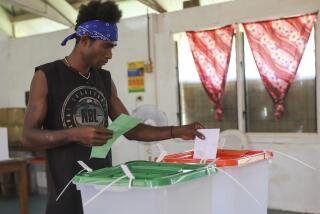Turnout Heavy as Ulster Vote Tests Irish Accord
- Share via
BELFAST, Northern Ireland — Protestants and Roman Catholics in this bitterly divided province turned out in large numbers Thursday to vote in the first major test of public support for last November’s Anglo-Irish agreement giving the Irish Republic a say in Northern Ireland’s affairs.
Amid tight security that included armed police at polling stations, voting went off peacefully in what was widely seen as a referendum on the accord. Vote counting is scheduled to start this morning, with the results expected before the end of the day.
The election, for 15 of Northern Ireland’s 17 seats in the British Parliament, was held because members of Parliament from the province’s two Protestant-dominated political parties resigned en masse to force the de facto referendum on the accord.
The Protestant-based parties are hoping that a large vote for their candidates might persuade British Prime Minister Margaret Thatcher to scrap the agreement, aimed at promoting peace and giving the province’s Catholic minority a political stake.
Protestants see the agreement as the first step in a plot between Thatcher and Irish Prime Minister Garret FitzGerald to transfer sovereignty in the province from Britain to the predominantly Catholic Irish Republic.
Catholics make up about 40% of the population here, but historically they have been shut out of the political process by the majority Protestants. Violence between the two communities has claimed nearly 2,500 lives in the last 17 years and has generated a fear that warps Ulster’s social fabric.
The United States has indicated its willingness to support the accord financially.
In all but three of the 15 districts in Thursday’s election, the winners are a foregone conclusion. Indeed, in four constituencies, Protestant candidates are unopposed.
However, the size of the vote is considered important political leverage. Protestant political leaders, who argue that any vote for their candidates is a vote against the agreement, have said privately that they hope to get half a million votes, nearly 20% more than their previous high in the 1983 parliamentary elections.
However, in three mainly rural constituencies bordering the Irish Republic, there is a slim chance that Protestants could suffer the embarrassment of losing to moderate Catholic candidates.
The two Catholic members of Parliament from Northern Ireland did not resign their seats, and there are no elections in their constituencies.
Both the British and Irish governments will be closely watching vote totals to gauge support for the aggressive rhetoric of Protestant political leaders. Some of these leaders, including the Rev. Ian Paisley, have denounced the agreement’s architects as “hell-deserving sinners” and agents of “our ancient enemy, the Church of Rome.”
A low Protestant turnout and any slippage in support for the radical Sinn Fein party, which advocates violence to end British rule in the province, would be quickly hailed as a show of support for the agreement.
The primary goal of the accord is to undercut Catholic extremists, including Sinn Fein and its outlawed guerrilla wing, the Irish Republican Army, by offering moderate Catholics an active role in the province’s political life.
It is one of many contradictions of the Northern Ireland problem that Protestant leaders want a high vote for Sinn Fein, a party that embraces their bitterest enemies.
“They are against the agreement so we’ll count every Sinn Fein vote as a vote against the agreement,” said Frank Millar, general secretary of the largest Protestant party, the Official Unionists.
More to Read
Sign up for Essential California
The most important California stories and recommendations in your inbox every morning.
You may occasionally receive promotional content from the Los Angeles Times.













